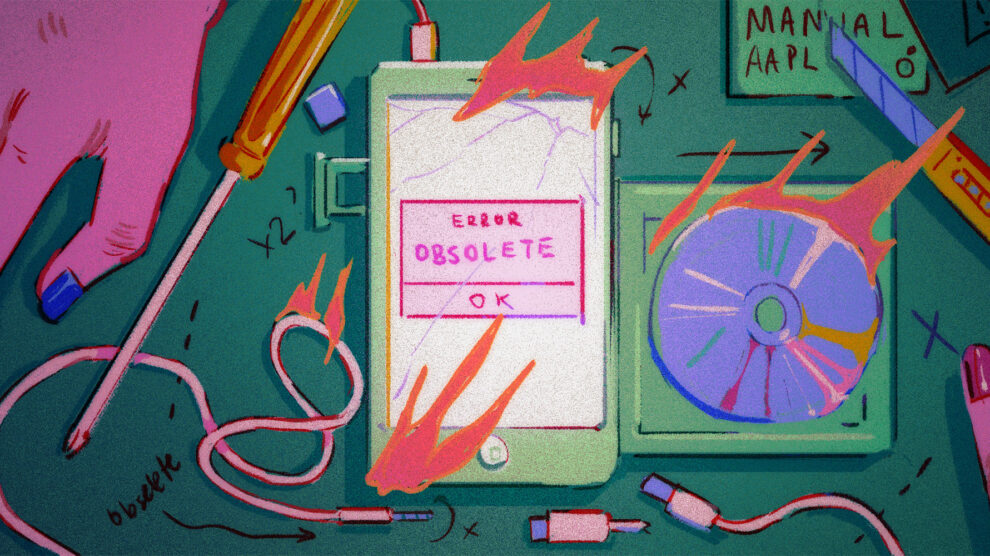September 8, 2023
Degrowth and Ecosocialist Revolution
Panel Discussion at Socialism 2023
By Erica Jung and Güney Işıkara
It is becoming increasingly clear that humanity cannot resolve the anthropogenic ecological crises without radically restructuring our social relations—a consensus shared by the degrowth movement and revolutionary socialism.

In this panel, which took place during Socialism 2023 in Chicago on September 3, Erica Jung and Güney Işıkara discussed converging and diverging theoretical imperatives and strategies among radical environmental activists, with the goal of enriching and strengthening our collective struggle for an ecosocialist future. Below is the transcript lightly edited for clarity.
Erica Jung is a graduate student in Environmental Policy. In 2021, she co-founded DegrowNYC to develop local degrowth organizers of color. She is also a member of Nodutdol for Korean Community Development.
Güney Işıkara is an assistant professor of Liberal Studies at New York University. His research focuses on political economy of the environment, comparative economic systems, economic theory and history.
—
Erica Jung:
On October 8th, 2018, the United Nations Intergovernmental Panel on Climate Change (IPCC) released a landmark support on the impacts of the rise of global warming by 1.5 degrees Celsius above pre-industrial levels. The verdict was that we had twelve years to limit climate change catastrophe. In order to limit global warming down to 1.5 degrees Celsius, we would need to slash global greenhouse gas emissions 45 percent below 2010 levels by 2030 and reach net zero by 2050. And yet, current trends leave little room for optimism, as global CO2 emissions rebounded to their highest level in history in 2022. In fact, scientists are now warning us that the world will likely breach the 1.5 degree Celsius climate threshold by 2027. Our present policy trajectory of 2.7 degrees of warming will expose two billion people to extreme heat, 99.7% of whom live in the Global South. These people have done nothing to cause the crisis, yet they are the ones who will bear its effects.
Developed nations are overwhelmingly responsible for the climate crisis, having produced about 80 percent of greenhouse gas emissions in the earth’s atmosphere from 1850 to 2011. Today, the Global North (defined as the United States, Canada, Europe, Israel, Australia, New Zealand and Japan) is responsible for 92 percent of excess global CO2 emissions. In contrast, the Global South is responsible for just 8 percent. If every person in the world consumed as much as the average US citizen, we would need 5.1 planets.
The overdevelopment of the Global North has only been possible through the underdevelopment of the Global South. Economic growth in the Global North was fueled by the colonial pillage of countries in the Global South. The resulting structures of this global extraction continue this legacy today through neocolonialism, unequal trade regimes, and debt. In order to expand their economies and obtain even more wealth, countries in the Global North have forcibly exported the capitalist growth model to the rest of the world. This in turn secured their access to new markets and cheaper labor pools, further widening the frontiers of resource extraction.
As a result, almost all countries base their economic model on growing their GDP, which accounts for the total value of all final goods and services newly produced within a country’s physical borders throughout the year. This doesn’t seem like a bad thing at first but it is an absolutely terrible indicator for human wellbeing. Anytime there is an oil spill and people are hired to clean it up, that increases GDP and technically grows the economy. Building luxury condos and displacing local residents increases GDP faster than building public housing and community health clinics. Arming millions of soldiers for war swells the economy more than conflict mitigation.
For the US economy to grow, it has to encroach on ever more Indigenous territories to extract fossil fuels and critical raw materials like lithium and relies on the super exploitation of prison laborers and migrant workers. None of this should be of any surprise when we understand that the US was founded as a settler colonial state built through slave labor. The economic growth model central to capitalism thrives off of the devastation of human life and the environment.
At the core of degrowth is a recognition that technology is limited and cannot save us from ecological catastrophe. In fact, these tech solutions are often implemented in ways that worsen the very catastrophes they are meant to avert.
This is why we must move towards an economy that is based on our right to live rather than our right to consume and extract at the expense of an invisibilized other. What we produce should be in accordance with ecological limits and how we divide up what we produce should be distributed in a way that fulfills everyone’s needs. That is at the core of degrowth. It envisions societies radically transforming the social relations of production and letting the people collectively decide what gets produced and how. This means that harmful industries like fossil fuels and advertising and the military can be phased out while necessary ones like healthcare, education, and public transit can expand to raise the collective wellbeing of society.
At the core of degrowth is also a recognition that technology is limited and cannot save us from ecological catastrophe. In fact, these tech solutions are often implemented in ways that worsen the very catastrophes they are meant to avert. For instance, renewable energy may be preferable to fossil fuels, but it still requires the extraction of raw critical minerals like lithium for battery storage as well as the use of fossil fuels to build the infrastructure needed for solar panels and wind turbines in the first place. These resources have overwhelmingly been extracted from the Global South, devastating their communities and livelihoods. This is not to say that we shouldn’t expand our current renewable energy capacity, but rather that these expansions should be pursued in consideration of ecological limits. More importantly, we must decrease, or “degrow,” our demand for energy otherwise our transition to renewable energy won’t make a dent in our carbon footprint.
Techno-optimists who criticize degrowth believe that we can solve the ecological crisis by relying on speculative negative emissions technology to pull excess carbon out of the atmosphere. The most notable example of this is bioenergy with carbon capture and storage, also known as BECCs. These techno-optimist solutions have been largely criticized by scientists across the world. This is because BECCS would require vast tracts of land for biofuel monoculture, up to three times the size of India, which would be appropriated overwhelmingly from the Global South. This excessive use of land would exacerbate deforestation, soil and water depletion, biodiversity loss, and other ecosystem damages, while constraining food availability. Relying on this approach is unjust and ecologically imperialist.
As degrowthers, we know that technological progress can and must be centered around human needs rather than on capital accumulation. With a socialist state, investments can be easily directed towards these goals. Take Cuba for example, which has one of the best healthcare systems in the world, has developed its own set of COVID vaccines under the crushing weight of the embargo, and has continuously sent doctors around the world to fight deadly viruses like COVID-19.
Through degrowth, we can reduce our consumption levels of energy and materials, and we can better prepare for the climate crisis by organizing ourselves and our priorities around the principles of care, autonomy, and sufficiency rather than around GDP growth.
Whereas under capitalism, care work is unpaid, devalued, and invisibilized for the sake of economic growth, under a degrowth world we can redistribute the responsibility of care along less gendered and more equitable lines. The value of our labor would come from the ability to restore and sustain life rather than destroying it. In that same vein, we also need autonomy, which is the ability to govern ourselves, collectively and consciously, and meet our own needs without relying on the market. And lastly, we need sufficiency, the idea that no one should have too much in relation to planetary boundaries. As socialists here in the US, we know that food insecurity and homelessness exist not because we don’t have enough food and housing for everyone, but rather because the way they are allocated depends on how much you can contribute to the economy.
These three principles are key to undertaking a degrowth transformation that requires us to slow down and unlearn the dominant ideology of infinite growth that has been ingrained in every aspect of our lives.
The fight for ecosocialist degrowth starts with joining an organization committed to the dismantlement of US empire and settler colonialism.
Now it’s important to recognize that economic growth and capital accumulation are preconditions of capitalism. Capitalism is only able to survive so long as it is continuously expanding production and consumption, and accumulating capital for the sake of maximizing profit. Therefore, in order to move past capitalism, we need to first move past our outdated growth mindsets and allow ourselves to envision the world in new ways. We must work to fight for an eco-socialist degrowth that sufficiently challenges the dictatorship of capital and puts the people in charge of their own destinies.
And this starts with joining an organization committed to the dismantlement of US empire and settler colonialism. We all must organize towards class struggle and what comes after. The idea of class struggle is key here because degrowthers across the political spectrum must understand that the rich will not simply consume less and give up their exorbitant lifestyles for the planet. If they are willing to get rich at the expense of exploiting poor people, why would they be willing to give up their vested class interests for the sake of climate change? Even in the unlikely circumstance where a couple of 1 percenters gave away all their wealth to the working class, this would not change the fact that we live under a system that rewards those who plunder the earth’s resources and exploit human labor.
Creating parallel structures predicated on decentralized models of self-organization is great, but it can’t dismantle US empire. It can’t change the fact that the US military is the single largest institutional polluter in the world, operating about 900 military bases. It can’t stop Japan from releasing radioactive waste water into the Pacific Ocean and imperiling the livelihoods of millions of people. And it won’t stop multinational corporations like DuPont, Monsanto, and Syngenta from controlling 55 percent of the global seed market. We need organization to seize power, defend our gains, and achieve victory. As Vijay Prashad puts it, “organization is what bridges theory and practice. These three concepts are essential to each other. You can’t just have theory and practice, you gotta have an organization.” After all, if we do not successfully build a degrowth organization, how can we be expected to build a degrowth city, state, or world?
We can spend all day arguing on Twitter about whether we should have year-round access to bananas at the expense of the global proletariat, or we can join an organization and commit to developing ourselves and others for revolution. James and Grace Lee Boggs wrote that organization is where we “continuously [re-evaluate our] theory and practice and continuously [transform ourselves] so as to be better able to live up to the historic tasks for which [we] have accepted responsibility.” Through DegrowNYC, a collective of degrowth advocates of color who view degrowth as a revolutionary process and a form of ecological reparations, we develop ourselves through revolutionary theory and ongoing political education in order to shift the conversation on climate action towards socialism and revolution.
Meanwhile, organizations centered on national liberation struggles like Nodutdol—of which I am also a part of—Palestinian Youth Movement, Anakbayan, Black Alliance for Peace, and so much more, are mobilizing members of their respective diasporas to fight back against US imperialism here in direct solidarity with their brothers and sisters abroad. The Party for Socialism and Liberation has been campaigning for years to end the US blockade on Cuba, the world’s most sustainable country. Science for the People, which has multiple chapters across the world and within the US, has an entire working group dedicated to analyzing the effects of militarism and military funding on science, scientists, and domestic and international policy. Our comrades at DSA just scored a huge success in getting New York state to pass the Build Public Renewables Act (BPRA), a publicly funded renewable energy program that the DSA has been campaigning for since 2019.
While these organizations may fall on different parts of the left’s political spectrum, their diversity of tactics are crucial to building sustained momentum towards the possibility of revolution. We still need non-reformist reforms like public renewables that can create more favorable material conditions for organizing. However, they should not be the end goal. And while the prospect of organizing towards revolution seems impossible in light of the accelerating nature of the climate crisis, we have no other option. In the absence of commitment to organization and discipline, we risk falling into adventurist tendencies that can set a movement back decades. Just because we now know how to blow up a pipeline doesn’t mean we should! We actually have a lot to learn from revolutionary history and current socialist states like Venezuela and Cuba, which have made important strides in raising the material standard of living for its people. However, the people of Venezuela and Cuba continue to suffer from devastating sanctions waged by the US and its imperialist allies.
Those of us living in the imperial core therefore have a responsibility to the people of the global South to degrow and dismantle US empire. We cannot settle for less. Thank you.
—
Güney Işıkara:
Hello everyone! Thank you so much for that. It was amazing. I have to start by saying that I agree with almost everything that Erica said. And still, I will raise some critical points against degrowth—not against her take on it, as it seems that we agree on almost everything, but I will be addressing the broader degrowth literature at large. And I think it is important to elaborate or think on these nodes of tension between advocates of degrowth and socialism which emerged in the debates over the past ten years or so. It helps us understand how we vision the future, the socialist future, also what they called the post-growth society and how we contemplate transition from now to that future.
Now what capitalism gives us today is a slow motion death, a slow motion destruction. And by that, I do not mean that it’s destroying itself. There, I’m rather in favor of being agnostic. Capitalism is a highly adaptive system. I think it’s politically more plausible to assume that it’s not going to kill itself by itself. But what it is certainly killing, what it’s certainly destroying is our lives, future lives, ecosystems, species, and so on. And what is absolutely crucial at the starting point is to grasp capitalism as a totality and not in a fragmented or partial way.
So it’s not the case that we’re confronted with, say, an idiosyncratic, isolated case of extreme wealth and inequality here, and then on the next isolated island, we have the care crisis, and that is a separate case of racism, and then another isolated idiosyncratic case of the ecological destruction. That’s not the case. These are all outcomes—well, actually not outcomes—but parts and parcel of how capitalism functions.
Also on the side of causality, it’s not some misinformed, misled, regressive tax policies of only the past 20–30 years that gave rise to this distribution. It’s not only a question of public underinvestment in care sectors that created the care crisis. And it’s not the lack of information, or a few bad apples, a few bad industries (e.g., the fossil fuel industry) and their representatives, which created the ecological crisis. This is how capitalism functions. This is what capitalism does. And we have to start with that. There is not some ideally functioning capitalism out there, that we have some imperfections in this world and that’s why we are struggling and confronted with the many grievances.
To an audience like this, what I have said so far is more or less trivial. But I’ll try to explain why it has bearings for the debate between advocates of degrowth and ecosocialism. I’m very happy to see some signals of convergence there. Erica, to be honest, is the closest voice from the degrowth side that I have so far gotten to know.
Degrowth is in a much better position to grasp the contradictions of contemporary capitalism than the hegemonic view of a green new deal or green Keynesianism.
Let me start by saying that degrowth has many merits. As a person who has been critical of, if not polemical against degrowth at times, I have always tried to distance myself from its flat dismissals on grounds of neo-Malthusianism, which usually come from people who, in my opinion, don’t even dare to properly sit down and read the argument.
So, I have to be very clear there. The degrowth literature, thought, and the movements feed from Marxist, ecosocialist, and feminist critiques of capitalism. It feeds from abolitionist, anti-racist, and anti-colonial histories and theories. And as such, it is in a much better position to grasp the contradictions of contemporary capitalism than the hegemonic view of a green new deal, green Keynesianism, or some sort of green growth advocates like the idea that if you just allocate 2–3 percent of global GDP to green energy and that will make the transition and everything will be fine. The whole point of social relations is missing there.
But this is precisely the point—the point that capitalism is a totality is where my questions to, and problems with degrowth start.
The best degrowth thinkers—and by best I mean those who perceive degrowth as a revolutionary process and a revolutionary project rather than those within the spectrum with moral or consumptionist critiques of capitalism, with whom I have very little commonality; but with people like Giorgos Kallis, Jason Hickel, and authors of the book that was published last year, The Future is Degrowth (Vetter, Vansintjan, Schmelzer) whom I shared a lot of commonality—it is them who explicitly, time and again, write that growth is an outcome under capitalism; it is not the driving force but the surface appearance of the underlying process of capital accumulation, which is an imperative.
Thus, I struggle to understand why we revert back to a growth-centered paradigm because economic growth as we know it emerged both as a fact, as a phenomenon, and as a concept, a measure within the capitalist society. By default, when we speak of economic growth, we speak of capitalist growth with its peculiar foundations in the processes of exploitation, appropriation, expansion, imperial aggression, and so on, which Erica mentioned in detail. And the measure itself, the quality of growth, has its own history and evolution, which reflects the needs and the ideology of the ruling classes of capital accumulation: the GDP, or any other metric employed by economists.
Therefore, I don’t see why we should obsess so much with growth rather than capitalism. Our enemy is capitalism, not growth. When it comes to growth in a future socialist or post-growth society—obviously there’s no growth in the post-growth society—but in a socialist society, I would rather be agnostic because we can totally come up with different ways of looking at the question!
Once we live in a society where production is not organized around the profit motive and in the absence of competitive pressures in production, why should we in the first place be concerned so much with the aggravated measures of growth? We can totally come up with different measures that take into account qualitative aspects of living standards. Nobody would disagree with me if I said that the vast majority of the global population needs to see their living standards grow, not degrow—and degrowthers agree with that too. And within that vast majority, still a significant chunk of people need to see their material consumption grow because the majority of people are under-consuming. The problem is not there, the problem is not in Africa, the problem is not in Indonesia, the problem is not in the Middle East. So, that is one reason why I think we don’t need to try to institutionalize the idea of degrowth. We can be agnostic. But with the caveat that there will be no obsession, no fetishized growth for growth, accumulation for accumulation—that must be said.
This is the first point that I would like to raise. Let me stop here. Usually, this discussion goes all the way down to a discussion of entropy, the Second Law of Thermodynamics. The idea that the universe is moving toward disorder from order and ultimately has to stop growing, but let’s spare that for the Q&A.
So that’s the first point. The second point is extrapolated from the first point that I raised. Again, people who articulate and conceptualize degrowth in the terms that come closest to socialism as the ones that I just mentioned, when it comes to the question of “All right? What is to be done now?” I see some confusion. The confusion usually represents itself in the presentation of a list of eclectic reforms, which are usually referred to as “non-reformist reforms” with references to André Gorz or Rosa Luxemburg. Let me mention a few.
For example, we have to decommodify labor power and take the existing workload and distribute it to the working population as to, on the one hand, eliminate unemployment, establish full employment (in the literal sense not in the macroeconomic sense), and at the same time, significantly reduce working hours. On top of that, another non-reformist reform is to socialize or nationalize the banking and the credit system. And another is to reorganize the care work communally and so on and so forth. It’s a long list. I mean, every single one of these measures is welcomed to me by heart.
However, the problem I see is that any one of them—abolishing unemployment, decommodifying labor power, and allocating labor in a way to reduce working hours—rips at the heart of capitalism. I mean, there is no capitalism without the labor market; there is no capitalism where workers are not threatened by unemployment! And given the impacts of full employment in a capitalist economy on real wages, it comes at no surprise that no single capitalist economy in history has ever come close to that aim, except for, guess what, Nazi Germany, because they were able to cut the relationships between the labor market and real wages through absolute political repression.
Again, all these non-reformatist reforms belong to that socialist future, belong to what they call a degrowth society, post-capitalist economy. But they cannot be achieved within a capitalist context.
Now, let’s assume that we are there, by putting the question of revolution aside. Even in that case, the economic model described by the degrowth literature is a little ambiguous because usually what they refer to as a mixed economy is that the sphere and role of the market would be significantly reduced (very nice!); production will be organized by a mixture of public enterprises, private enterprises, NGOs, but most importantly, steered by worker co-ops; and that the social surplus will be spent on what they call “dépense” activities (festivities and things that increase our joy of life).
The first point is curious because when we say we want to get rid of markets, we don’t want to produce for profits, but for use-values, for social needs and social utility, and we don’t want to produce or organize this process through markets because it is linked with commodification—it’s very nice—but the problem is that whether or not we like it, the market is how capitalism tackles the question of the extremely complicated task of coordinating a regional, national, or global economy on a daily basis. Every single one of us uses hundreds of commodities on a daily basis and the production of them is not an easy task. How capitalism does it is through a decentralized manner, namely, the market as the avenues where commodities, money, resources, investments, labor power, is moving, and the direction and the speed of that movement are determined by profits. Now, if you say we’re gonna get rid of profits, and we’re gonna get rid of markets, we have to put something in that place.
We’re not hopeless. We have the means! It is called planning.
But the problem was that the degrowth literature deliberately avoided for almost two decades any reference to planning, because of its obvious links to socialism. So that was the second problem. I am, nevertheless, very happy to see that a convergence is taking place these days and more and more degrowth thinkers and people in the movement are explicitly acknowledging the fact that if we want to achieve our goals, we need to plan the economy. Well, if we need to plan the economy, that comes with a package, right? You have to expropriate the expropriators.
We can’t construct the new without demolishing the old. And the singular focus on how to build a new distracts us from the primary goal of tearing down the old.
Due to time limitations I’ll only raise one more point, which is closely related to the first two points. The second point was what is to be done and the third point relates to that: how.
The degrowth literature embraces a spectrum of ways of resisting and struggling: blockades, civil disobedience, local horizontal voluntary organizations, and community organizing. I have no problem whatsoever with any of them. My problem is that we’ll limit ourselves if we stop there. It is one-sided. We do need the decisive moment of rupture, which needs to be organized. Otherwise, as we have seen historically, there two issues, two problems:
1) Any theory or social movement, which does not explicitly aim to overthrow capitalism, can easily get co-opted, rearticulated, appropriated by capital. Well, we have a name for that: social democracy, right? But also the green environmental movement in some but not all countries. Green parties used to be some radical parties 15–20 years ago; nowadays in Germany, the Green Party is the greatest warmonger. I saw the co-chair of the party the other day saying why they resist raises of minimum wages in the agricultural sector because it “hurts the competitiveness of the country.” That’s the German Green Party speaking.
2) Of course, we don’t have a ready-made recipe written for how to make a revolution—if we knew it, we’d do it now—but we know very well some of the obstacles that we will certainly have to confront in that process. We have to be very honest with ourselves about the monopoly use of violence by the state, and those in power. And this is something that has been turned a blind eye by the degrowth literature for a very long time. In fact, I know only one book which makes a reference to this issue. If the aim is to basically take away the wealth and political power of those in power, they will not passively sit and peacefully watch us doing it while we dismantle the mechanisms. This is not a surprise, right?—both in core countries and in colonies. Think of Allende, Chile, ‘73. Think of Patrice Lumumba ‘61 in the Congo, Thomas Sankara ‘87, Burkina Faso. Think of Russia immediately after the Bolshevik Revolution of October, dozens of coup attempts followed by an imperialism sponsored civil war, which wasted years of the country. And we can multiply these examples. There is no need to be naive about this. We have to be prepared.
So let me just wrap up with that. We can’t construct the new without demolishing the old. And the singular focus on how to build a new, in my opinion, distracts us from the primary goal of tearing down the old.
Now these are not totally separated processes. I’m aware that they are entangled with each other, but what we have to be thinking is—I agree with Erica there, that was her conclusion as well—how to build revolutionary organizations, which can establish these relations; how to bring out, how to help working classes turn into a political class for itself, but at the same time of its relationship to the marginalized and the oppressed at large; how we are planning to confront the rising waves of nationalism, chauvinism, increasing chances of ecological apartheid; how are we going to deal with all that?
Organization must be our priority task. And for whatever we do, our horizon must be a communist horizon. I believe that what is really good in degrowth is sublated in many ways by the socialist project and thus convergence can take place. But there’s still a lot that we need to work out.
For further reading
Jamie Tyberg and Erica Jung, “Degrowth and Revolutionary Organizing,” Rosa Luxemburg Stiftung (blog), October 21, 2021.
Güney Işıkara and Özgür Narin, “Degrowth and Socialism: Notes on Some Critical Junctures,” Monthly Review 75, no. 3 (July 1, 2023).





